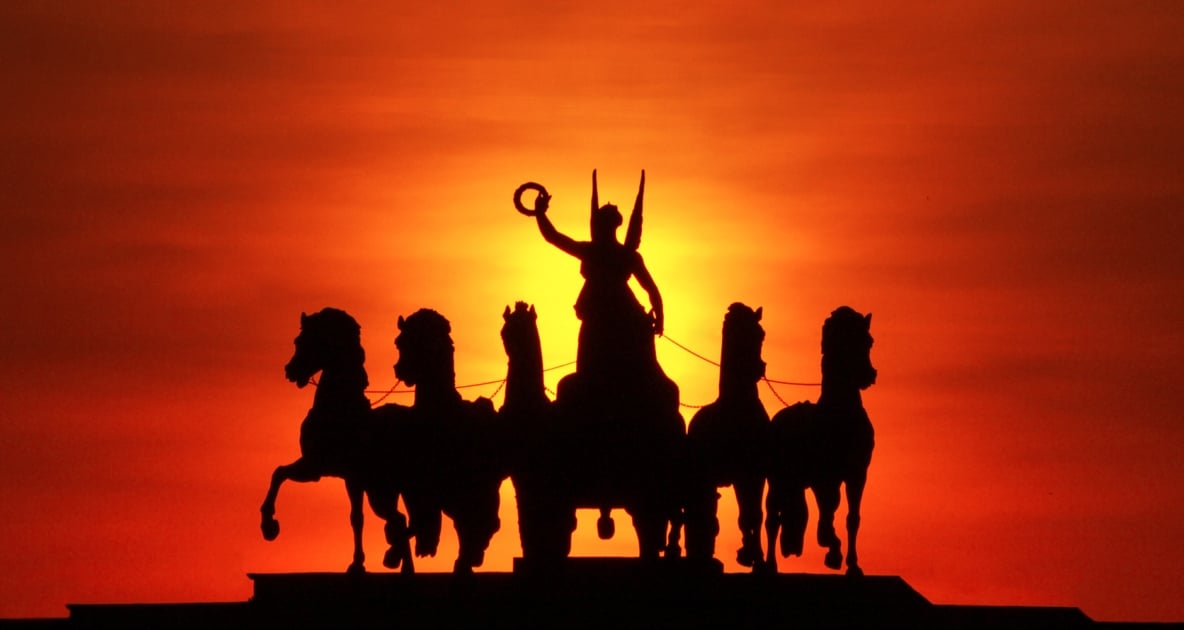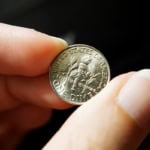Chariot of the Sun Weather Folklore
The ancient Greeks believed the Sun traveled across the sky in a flaming chariot pulled by four fiery, winged horses. Learn more!

Long before modern science began to understand the processes that create our weather, people made up their own explanations. Many of these accounts were fantastic in nature, with evil or benevolent gods, monsters, and spirits controlling the elements. In this series, we’ll explore some of these ancient myths and share the science behind them.
The Sun is such a pervasive, and important, part of life on Earth, that most ancient civilizations’ religious lives included a Sun god or goddess. The ancient Greeks were no different.
The Greek Legend of the Sun
Like most other solar deities, their Sun god, Helios, was described as handsome and charming. He wore a magnificent shining crown upon his head and drove a chariot pulled by four fiery winged steeds—Pyrois, Aeos, Aethon, and Phlegon—across the sky, from east to west, each day, shining his light upon the people of Earth.
At night, he descended into the bowl of a golden cup below the ocean in the western land of the Hesperides and was carried home to his golden palace, east of the River Okeanos, to rest before beginning his journey again in the morning.
Numerous myths and legends surround Helios, who was sometimes conflated with Apollo, one of Greece’s most popular and beloved gods. In Homer’s Odyssey, the gods kill Odysseus’ crew to punish them for eating cattle that belong to Helios. In another myth, Helios’ own son, Phaeton, is killed by the god Zeus after Helios allows the boy to drive his chariot, and Phaeton loses control, scorching the Earth (but that’s a myth for another time).
Like solar deities themselves, the imagery of the Sun being conveyed across the sky by a chariot or boat was common to many ancient cultures, and it’s easy to understand why. If you’re working from the assumption that the Earth is a static, fixed entity — which is how most people understood the Earth for most of human history — then it appears that the Sun does, in fact, move across the sky each day, making a journey from east to west, where it sinks below the ground (or the ocean, depending on your vantage point) to rest.
Today, we know that the Earth is not a solid lynchpin that all of the other objects in space revolve around. Though it may not feel like it from where we stand, the Earth is actually hurtling through space at the breakneck speed of 67,062 miles per hour! And while the Sun is also moving, revolving its way around the Milky Way, we are moving with it, so from our perspective, the Sun stands still. All the while, the Earth is also spinning on its axis, one full rotation every 24 hours. It is the Earth’s rotation that causes the apparent movement of the Sun across the sky. As the Earth turns, different areas of the globe directly face the Sun’s light at different times. When our little slice of the world is pointing directly at the Sun, it’s noon in our part of the world. When we are pointed in the exact opposite direction, it’s midnight.
During the time of the ancient Greeks, however, most people believed in a geocentric, or Earth-centered, universe. Though the idea that the Earth and other planets revolved around the Sun was proposed as early the Third Century BC by Greek astronomer Aristarchus of Samos, this theory was widely disregarded. It wasn’t until the 16th Century that the Renaissance astronomer Nicolaus Copernicus was able to gain some credence for a heliocentric, or Sun-centered, model.
And so, naturally, the ancient Greeks pictured the radiant god Helios moving smoothly across the sky on the wheels of a great chariot to shine his brilliance on the mortals below.

Jaime McLeod
Jaime McLeod is a longtime journalist who has written for a wide variety of newspapers, magazines, and websites, including MTV.com. She enjoys the outdoors, growing and eating organic food, and is interested in all aspects of natural wellness.






“Don’t knock the weather. If it didn’t change once in a while, nine out of ten people couldn’t start a conversation.”
Kin Hubbard (1868 – 1930)
Which is why I enjoy this site. It gives a different perspective to the conversation.
Thank you, Jaime McLeod. (is it pronounced “mc cloud”?)
Jack
Hi Jack,
Yep, it’s pronounced “MacCloud.” You’ll often see it spelled that way, actually. It’s just an Americanization of the same ancestral name.